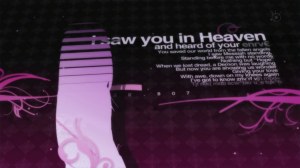Slowpoke may be appropriate here, as Eden of the East has definitely made quite the splash. However, there are a lot of subtleties that I’ve been mulling over in the two or so episodes I’ve seen. In particular, Eden of the East feels very “western” – and that’s not just because of the English voice-acting. Rather, the entire series seems to allude to a sense of western political and religious institutions – very striking, coming from what is essentially a Japanese animated work. A pretension warning is probably required here before we move on, but as I always say: “It’s only pretentious until you get the references. After you get the references, it’s intelligent.”
What’s very striking about East of Eden is that it is very much an intertextual work. Let’s begin with the title itself, which is a reference to Steinbeck’s classic East of Eden – a book that itself is an allusion to the Biblical stories of Cain and Abel. In the long run, perhaps we’ll not see too many similarities, although I’m sure any enterprising lit majors watching this might want to take a stab at it.
Moving on to the OP, then. I’m assuming for the most part that these are intentional, and not random English chatter. Some excerpts:

"I saw you in Heaven and heard your glory/You saved our world from the fallen angels/I saw Messiah standing/Standing before me with no words/Nothing but "Hope"/When we lost dread, a Demon was laughing/But now you are showing us your wonder/Giving your love/With awe, down on my knees again/I've got to know you're the one/The only one reveals the world"
Not exactly strongly theologically grounded, but they would not sound terribly out of place in a Pentacostal church or the like. Here’s the political side of it now, in the second half of the OP:

"The abuse of greatness comes when it disjoins remorse from power"
“The abuse of greatness comes when it disjoins remorese (sic) from power.” I’m assuming this simply is a mispelling of “remorse” – and strikes me as a critique of how often governance – especially American style government, separates powers by splitting tasks among various branches. More to come:

"Noblesse Oblige"
Well, they got the french down. A loanword (or phrase) that refers to the moral obligation of the rich to give back to the wider community. A sort of proto-socialism, if you will; and it was for some time the underlying philosophy behind the British Conservative party (“Red Tories”, as they were called) – which explains why Britain is considerably more socialist than the States, and also why Canadian Conservatives are completely bipolar.

"The King has come!/To save us from the dark/Who could ever doubt?/We had faith"
By this point, I am getting serious Divine Right of Kings vibes.

Fairly obvious, but this symbol is also on the cell phone that Takizawa uses to contact Juiz.
Here, the classic symbol for justice – the sword and scales. Tellingly, the name “Juiz” is also displayed – the mysterious ‘concierge’ on the phone.

"Let me walk with you when I'm lost in the wild/I know you always lead me to another Eden/Let me bless your name, O Lord, O Lord/Your words will never fade away/Since we believe you're the light on earth/Reveals the world"
Again, the background text has some shaky grounding – pretty sure you won’t find that it even the most liberal Biblical translations, but it sounds appropriately preachy and has this Mosaic Exodus feel.
Dang, all that and not even to the episode content. More analysis to come.
April 28, 2009 at 5:59 pm
Making it not theologically grounded could be intentional, maybe they just wanted to have a conspiracy theory or Templar-like feel to it, and what better way than to have Apocrypha-esque language in the background?
April 29, 2009 at 12:30 am
Yeah, they definitely could be trying to play a sort of Da Vinci Code angle and just make it sound a lot more interesting, but we’ll see how the themes develop.